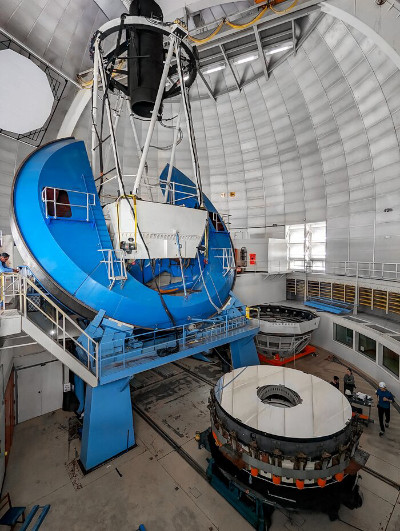Heising-Simons Foundation Award
Berkeley Lab receives Heising-Simons Foundation award for Spec-S5 optics study
February 26, 2025 — David Schlegel
Berkeley Lab Physics Division News

at Kitt Peak National Observatory in Tucson, Arizona (May 2018)
Credit: Marilyn Chung, Berkeley Lab
Berkeley Lab has received funding to design an innovative mirror system for Spec-S5, a premier cosmology experiment that will see first light in the 2030s.
Our understanding of the universe and the effects of dark energy are progressing rapidly thanks to groundbreaking observations from the Dark Energy Spectroscopic Instrument (DESI), a project led by Berkeley Lab at the Mayall Telescope in Arizona. Recent results from DESI suggest that the dark energy accelerating the expansion of the universe may be due to a dynamic field that is changing with time.
Berkeley Lab has received a $1M grant from the Heising-Simons Foundation to develop a new optics design for a next-generation cosmology experiment that would further explore dark energy as well as inflation physics in the very early universe. The goal of the study is to demonstrate the feasibility of upgrading the 3.8-meter primary mirrors on the Mayall Telescope and the Blanco Telescope (located in Chile, and a near-twin of the Mayall Telescope; both are NSF facilities operated by NOIRLab) with 6-meter segmented mirrors, for an increase in five times more light-collecting area.

Credit: KPNO/NOIRLab/NSF/AURA/P. Dunlap
This initial study would be an important first step in enabling the research and development of a Stage 5 spectroscopic program (or Spec-S5), as recommended in the 2023 Particle Physics Project Prioritization Panel (P5) Report, a roadmap for upcoming DOE experiments in high energy physics. In May 2024, Berkeley Lab hosted an international community of over 100 high-energy theorists and cosmologists for a spectroscopy workshop to explore the fundamental physics questions that could be addressed with future spectroscopic surveys. Spec-S5, a next-generation cosmology experiment that would see first light in the 2030s, will map galaxies over a much larger expanse of the distant universe than current experiments allow.